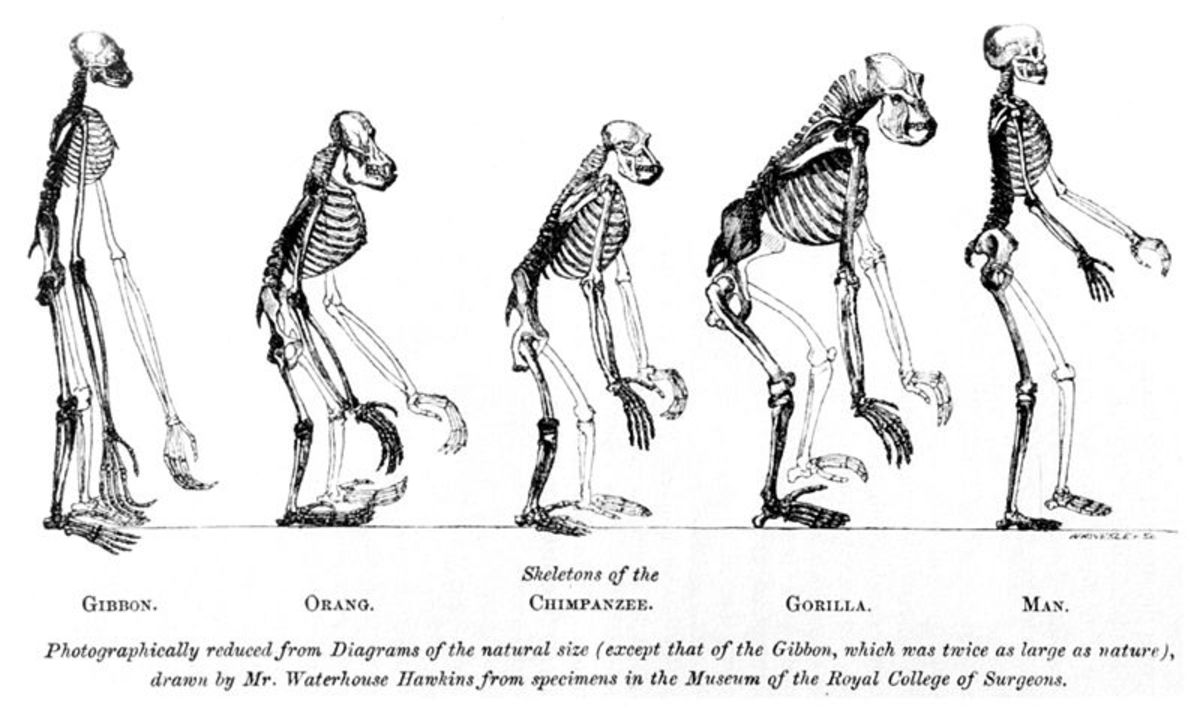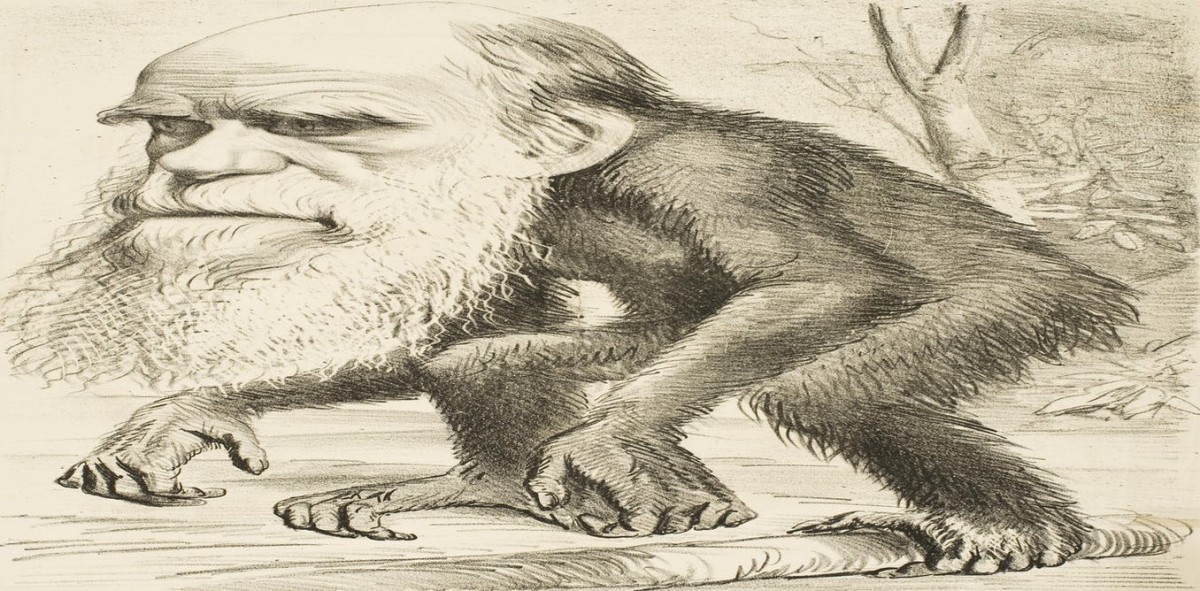EVOLUTION, PLAIN AND SIMPLE (PART I)
Preface
EVOLUTION, PLAIN AND SIMPLE
Robert George Sprackland, Ph.D.
© 2001, 2003, Robert George Sprackland, Ph.D.
Preface
There has been a considerable volume of literature generated on the subject of evolution. The scientific treatment of the theory that organisms change over time and eventually become new and different species began in earnest with Charles Darwin in 1859, and recently was the final major tome published by Darwin's intellectual great-grandchild, Stephen Jay Gould (2002). In recent years many of the popular books have been treatises for or against the theory written either by scientists or by so-called creation scientists. The latter have held that man and all life on earth were created by the divine action of God, and specifically God as a vocal group of predominantly Christian biblical literalists interpret God. Their modern crusade aims to have creationism taught as a scientific theory alongside evolution, a goal intended to trample not only science, but also the religious beliefs of all other peoples, including Christians, who are not biblical literalists. Their call for "equal time" treatment in our schools, supposedly balancing their creationist dogma with hard science, not only puts two different disciplines-religion and science-in the same arena, it does so at the expense of all religions and philosophies except one particular Christian interpretation. There is nothing fair in this proposal of "equal time."
In contrast, scientists frequently lament the dismal understanding of evolution among the most technologically advanced peoples of the world. How, they query, can highly educated and technologically savvy citizens fail to understand the basic mechanisms of the most over-arching biological theory yet advanced? Unlike many of my colleagues, I do not marvel at this information gap. People will believe what they choose to believe, and if an educated society cannot understand the voluminous evidence supporting evolution as a theory, it is in large part because it chooses not to understand. Then, too, evolutionary theory, like nuclear physics or complexity theory, is rarely presented in terms that make sense to the layman. People reject or ignore evolution for the same reasons they ignore quantum physics and calculus: because as conventionally presented in schools the subjects are dry, boring, and too laden with complex and abstract ideas to become part of daily discourse. The full impact of the relatively new field of complexity theory (evolved as it were from chaos theory) roosts squarely in the middle of evolutionary theory. Evolutionary events happen by a incalculable mixture of events ranging from genes to climate to timing, meaning that an evolutionary future cannot be predicted precisely because of the complexity affecting each and every organism. Furthermore all these subjects are usually advanced with little explanation of how or why they are important to society at large. If evolution is discussed conversationally, it is often from a perspective of poor science and poorer understanding.
It is also my belief that any subject can be conveyed in simple terms, but many of the most adept practitioners of a field are actually very poor communicators. Sadly, scientific peers often adversely criticize their fellow academics who communicate well by writing for the popular audience; there has long been an unwritten but well-known law of the academy that a good communicator (to an unspecialized audience) is to be treated as a poor scientist. A major U.S. Government report addressed the crisis of our "scientific illiteracy" under the title "A Nation at Risk." Though that report was highly flawed, one contributor noted wryly that if any foreign government had tried to do to our science education programs what we ourselves have done we would probably consider their intervention an act of war! Though the report was itself a product of very biased interests using hyperbole to make a point and political points, our science literacy is in serious jeopardy. Scientists continue to publish, though, with vast volumes of literature clogging our libraries. Much of it is not readable by laymen or scientists from different fields (that is, to use another phrase from educational jargon, scientists rarely "write across the curriculum"). If there is any success in my message, it will be because I am striving to translate some of this huge body of data in simple terms to a very broad lay audience.
Evolution is a fact, meaning it is scientifically as real and demonstrable as the roundness of the earth, the boiling point of water, or the pumping function of the heart. As a fact the importance of evolution as a cornerstone to science, scientific "progress," and our daily lives cannot be overstated. Geneticist Theodosius Dobzhansky has written (in one of the most frequently published quotes in science) "nothing in biology makes sense except in light of evolution." After all, why else would all mammals have warm blood, hair, mammary glands, a single lower jaw bone, unnucleated red blood cells, 4-chambered hearts, 12 pairs of cranial nerves, three tiny inner ear bones, and so on, if they did not inherit a common body plan from a common ancestor? Why would a terrible disease condition like sickle-cell anemia persist among people if there wasn't some survival advantage to be had from sickle-cell causing genes? Why do more and more bacteria survive attack by our antibiotics, soon to render us helpless to defend ourselves? Evolution provides the major framework for fighting diseases, understanding the very structure of life, and for cataloguing the diversity of the life on our planet. A basic understanding is essential to a society that considers itself educated, if only because so much of our survival is based upon - and will increasingly rely on - evolutionary constructs. Failure to understand this reality caused both China and the former Soviet Union, as we shall see later in this book, to experience massive crop failures and some of the largest numbers of deaths due to starvation in known history.
Darwin started the fireworks with the publication of his book, On The Origin of Species by Means of Natural Selection in 1859, exactly 142 years to the day prior to my writing this preface. Ironically, Darwin never did explain how species originate, nor did he advance a robust definition of "species." In fact, Darwin used many definitions in his great book. He did give us a mechanism by which the environment may mold and shape populations, leading eventually to changes that would cross the "species" boundary, calling the process Natural Selection. But in failing to define the term "species," he made it very difficult to know when a boundary was crossed, because we still did not know where the boundaries were. Ernst Mayr, a distinguished Harvard professor, ornithologist, and successor to Darwinian thought, noted that the mechanisms by which plants and animals underwent genetic changes were different enough that he would only discuss animal evolution in his book, Animal Species and Evolution. As a zoologist myself, I follow Mayr's prudence, and generally leave the subject of plants (and the other kingdoms of life) out of the following discussions.
What follows here is one zoologist's observations (mine) on the nature of species, and the ways they evolve in animals. To make the story more cohesive, I have kept most examples close to the animal groups with which I am most familiar, reptiles, amphibians, and fishes. In order to bring some of the concepts home to readers with little biological training, I use several analogies that are not always strictly biological. Though my personal experiences bias my selection, I trust that these groups adequately serve to demonstrate basic and universal concepts of evolution. My goal is to convey why biologists are adamant about the reality of evolution and why this subject is so vitally important in terms of the American educational system. Above all, I am trying to answer those questions that most frequently confuse the general public about this most important of biological theories.
FAQs: To see a list of commonly asked questions about biological evolution, see Dr. Sprackland's FAQs at: http://ezinearticles.com/?Getting-Started:-Basic-Questions-About-Evolution&id=192904.
To see one of Dr. Sprackland's essays about the evolution/creationism problem in public schools, visit http://ezinearticles.com/?Evolution,-Intelligent-Design,-and-the-Battle-for-the-American-Intellect&id=109913.
Robert Sprackland, Ph.D., is a professional zoologist who has taught biology, ecology, evolution, and human anatomy and physiology for nearly twenty years. His new book, Giant Lizards, 2nd Edition, will be available in October 2008.








